Last week, several members of Accruit joined other industry colleagues at the annual FEA conference in Chicago to hear about the latest updates regarding tax reform and the potential impact to 1031s. Through the efforts of the 1031 Coalition, the 1031 industry was successful in ensuring capping 1031s were not part of the revenue offsets presented by the House of Representatives earlier this month. This is a positive outcome as we typically see the Senate follow the lead on tax offsets from the House. Furthermore, on the Senate floor last month, Senator Kennedy (LA) submitted an amendment during a “vote-a-rama” to retain 1031s in their current state. Per the request of Senate Finance Chairman Wyden (OR) the vote was taken as a voice-vote and received unanimous support from all Senators.
This week, 1031 like-kind exchanges allow the country to repurpose inefficient commercial properties, 1031s actually produce a positive economic benefit, increase income taxes, and create additional jobs by stimulating our economy, and any attempts to cap the 1031 provision is equivalent to repeal. Senators Bennet (CO), Tester (MT) and Kennedy (LA) all showed wide support and understanding of our data and points of impact.
The efforts are not over and work still needs to be done. Accruit will participate in additional Hill meetings in the coming weeks. We still ask that anyone who may be impacted by a change in the 1031 code, please
Tag: 1031 like-kind exchange
-
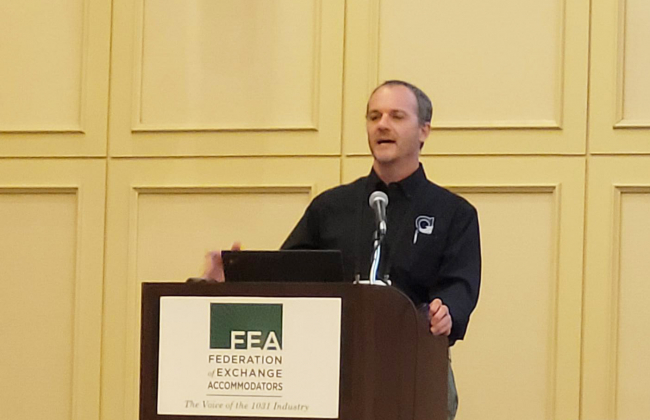
#Revolutionize1031 at FEA 2021
-
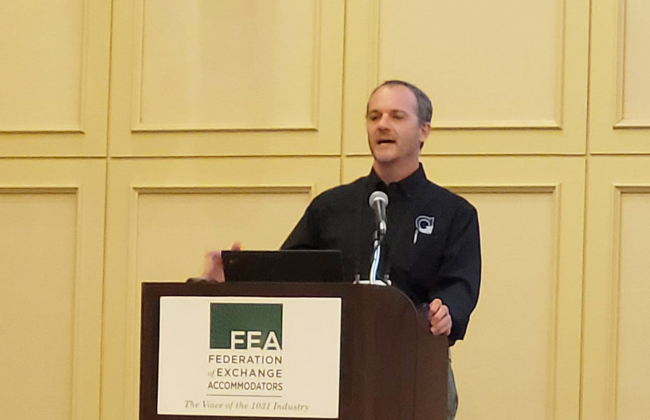
#Revolutionize1031 at FEA 2021
Last week, several members of Accruit joined other industry colleagues at the annual FEA conference in Chicago to hear about the latest updates regarding tax reform and the potential impact to 1031s. Through the efforts of the 1031 Coalition, the 1031 industry was successful in ensuring capping 1031s were not part of the revenue offsets presented by the House of Representatives earlier this month. This is a positive outcome as we typically see the Senate follow the lead on tax offsets from the House. Furthermore, on the Senate floor last month, Senator Kennedy (LA) submitted an amendment during a “vote-a-rama” to retain 1031s in their current state. Per the request of Senate Finance Chairman Wyden (OR) the vote was taken as a voice-vote and received unanimous support from all Senators.
This week, 1031 like-kind exchanges allow the country to repurpose inefficient commercial properties, 1031s actually produce a positive economic benefit, increase income taxes, and create additional jobs by stimulating our economy, and any attempts to cap the 1031 provision is equivalent to repeal. Senators Bennet (CO), Tester (MT) and Kennedy (LA) all showed wide support and understanding of our data and points of impact.
The efforts are not over and work still needs to be done. Accruit will participate in additional Hill meetings in the coming weeks. We still ask that anyone who may be impacted by a change in the 1031 code, please -
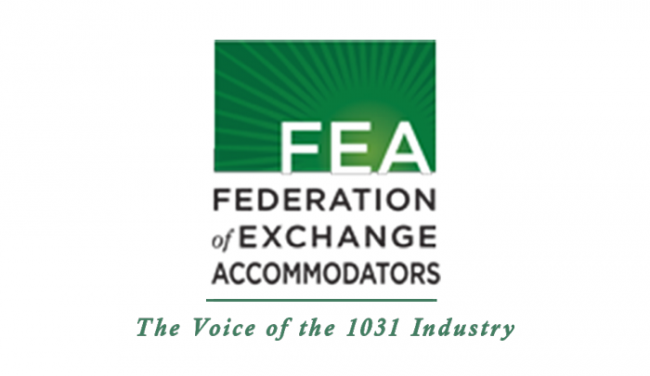
FEA Understanding the Impact of Depreciation on Like-Kind Exchanges
FEA “The Voice of the 1031 Industry” Releases an Important Paper This Week!
Understanding the Impact of Depreciation on Like-Kind Exchanges
“Like-kind exchanges under IRC §1031 support investment in commercial and residential real estate and encourage preservation of family-owned farms, ranches, and forestland. Like-kind exchanges provide deferral, not elimination, of tax. By preserving cash flow, section 1031 encourages taxpayers to divest properties that are under-utilized, inefficient, or that simply do not meet current needs, with replacement properties that will permit businesses to grow and thrive.” Read the complete article to learn more.
(Quote and Article Credit: FEA | Federal Exchange Accommodators)
“It was important for the FEA to publish a piece that provides clarity to the accounting and depreciation impact of 1031 transactions. I was pleased to collaborate with Suzanne Baker, from IPX1031 on this paper.”
– Brent Abrahm, President & Chief Executive Officer | AccruitClick to view and download the full article! –
-
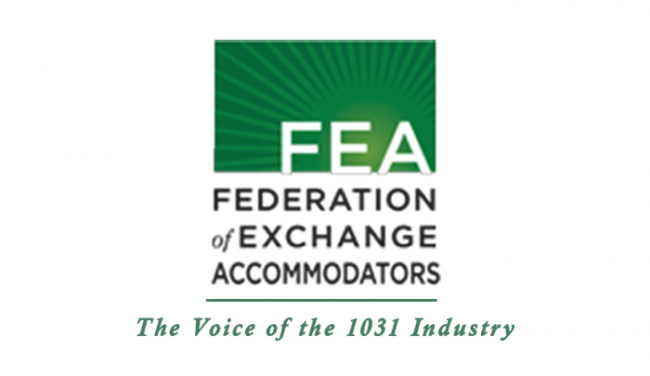
FEA Understanding the Impact of Depreciation on Like-Kind Exchanges
FEA “The Voice of the 1031 Industry” Releases an Important Paper This Week!
Understanding the Impact of Depreciation on Like-Kind Exchanges
“Like-kind exchanges under IRC §1031 support investment in commercial and residential real estate and encourage preservation of family-owned farms, ranches, and forestland. Like-kind exchanges provide deferral, not elimination, of tax. By preserving cash flow, section 1031 encourages taxpayers to divest properties that are under-utilized, inefficient, or that simply do not meet current needs, with replacement properties that will permit businesses to grow and thrive.” Read the complete article to learn more.
(Quote and Article Credit: FEA | Federal Exchange Accommodators)
“It was important for the FEA to publish a piece that provides clarity to the accounting and depreciation impact of 1031 transactions. I was pleased to collaborate with Suzanne Baker, from IPX1031 on this paper.”
– Brent Abrahm, President & Chief Executive Officer | AccruitClick to view and download the full article! –
-
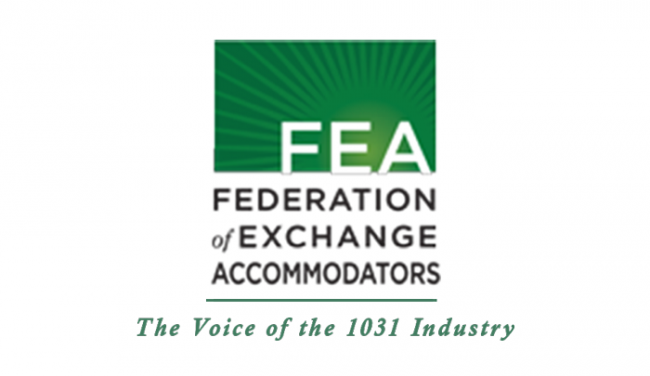
FEA Understanding the Impact of Depreciation on Like-Kind Exchanges
FEA “The Voice of the 1031 Industry” Releases an Important Paper This Week!
Understanding the Impact of Depreciation on Like-Kind Exchanges
“Like-kind exchanges under IRC §1031 support investment in commercial and residential real estate and encourage preservation of family-owned farms, ranches, and forestland. Like-kind exchanges provide deferral, not elimination, of tax. By preserving cash flow, section 1031 encourages taxpayers to divest properties that are under-utilized, inefficient, or that simply do not meet current needs, with replacement properties that will permit businesses to grow and thrive.” Read the complete article to learn more.
(Quote and Article Credit: FEA | Federal Exchange Accommodators)
“It was important for the FEA to publish a piece that provides clarity to the accounting and depreciation impact of 1031 transactions. I was pleased to collaborate with Suzanne Baker, from IPX1031 on this paper.”
– Brent Abrahm, President & Chief Executive Officer | AccruitClick to view and download the full article! –
-
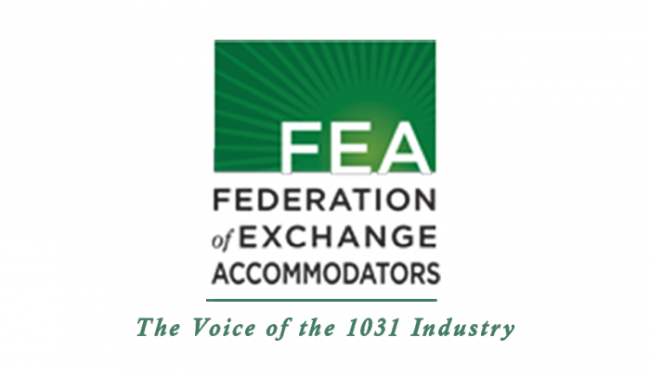
FEA Understanding the Impact of Depreciation on Like-Kind Exchanges
FEA “The Voice of the 1031 Industry” Releases an Important Paper This Week!
Understanding the Impact of Depreciation on Like-Kind Exchanges
“Like-kind exchanges under IRC §1031 support investment in commercial and residential real estate and encourage preservation of family-owned farms, ranches, and forestland. Like-kind exchanges provide deferral, not elimination, of tax. By preserving cash flow, section 1031 encourages taxpayers to divest properties that are under-utilized, inefficient, or that simply do not meet current needs, with replacement properties that will permit businesses to grow and thrive.” Read the complete article to learn more.
(Quote and Article Credit: FEA | Federal Exchange Accommodators)
“It was important for the FEA to publish a piece that provides clarity to the accounting and depreciation impact of 1031 transactions. I was pleased to collaborate with Suzanne Baker, from IPX1031 on this paper.”
– Brent Abrahm, President & Chief Executive Officer | AccruitClick to view and download the full article! –
-
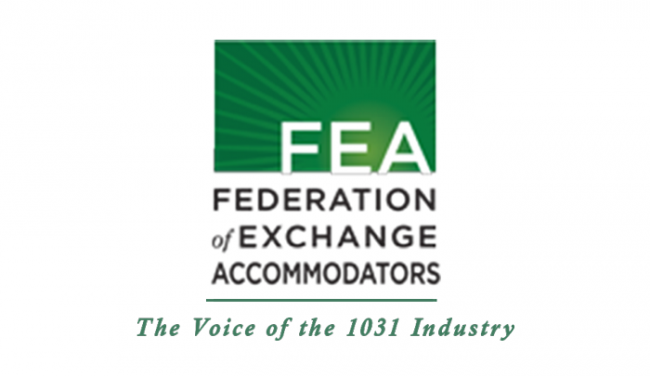
FEA Understanding the Impact of Depreciation on Like-Kind Exchanges
FEA “The Voice of the 1031 Industry” Releases an Important Paper This Week!
Understanding the Impact of Depreciation on Like-Kind Exchanges
“Like-kind exchanges under IRC §1031 support investment in commercial and residential real estate and encourage preservation of family-owned farms, ranches, and forestland. Like-kind exchanges provide deferral, not elimination, of tax. By preserving cash flow, section 1031 encourages taxpayers to divest properties that are under-utilized, inefficient, or that simply do not meet current needs, with replacement properties that will permit businesses to grow and thrive.” Read the complete article to learn more.
(Quote and Article Credit: FEA | Federal Exchange Accommodators)
“It was important for the FEA to publish a piece that provides clarity to the accounting and depreciation impact of 1031 transactions. I was pleased to collaborate with Suzanne Baker, from IPX1031 on this paper.”
– Brent Abrahm, President & Chief Executive Officer | AccruitClick to view and download the full article! –
-
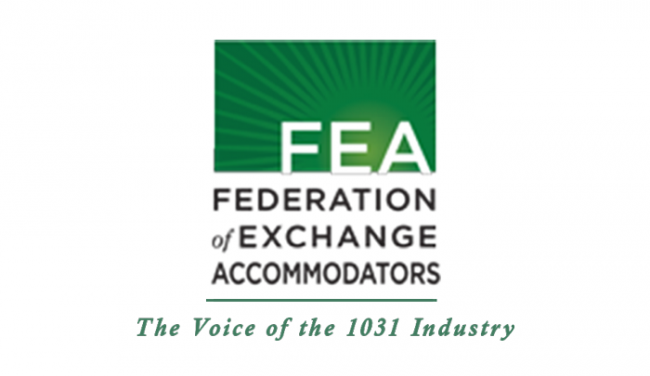
FEA Understanding the Impact of Depreciation on Like-Kind Exchanges
FEA “The Voice of the 1031 Industry” Releases an Important Paper This Week!
Understanding the Impact of Depreciation on Like-Kind Exchanges
“Like-kind exchanges under IRC §1031 support investment in commercial and residential real estate and encourage preservation of family-owned farms, ranches, and forestland. Like-kind exchanges provide deferral, not elimination, of tax. By preserving cash flow, section 1031 encourages taxpayers to divest properties that are under-utilized, inefficient, or that simply do not meet current needs, with replacement properties that will permit businesses to grow and thrive.” Read the complete article to learn more.
(Quote and Article Credit: FEA | Federal Exchange Accommodators)
“It was important for the FEA to publish a piece that provides clarity to the accounting and depreciation impact of 1031 transactions. I was pleased to collaborate with Suzanne Baker, from IPX1031 on this paper.”
– Brent Abrahm, President & Chief Executive Officer | AccruitClick to view and download the full article! –
-

Exchanging Equal or up in Value
Since 1921, the rules for qualifying and completing “Like-Kind”
Must Follow Exchange Time Limit & Identification Requirement
Properties Must Be Held for Business or Investment Purposes
Exchange Must Be Equal or Up in Value:To potentially defer all of the taxable gain, a property owner must first reinvest all of the equity in the relinquished property into the replacement property. Second, the purchase price of the property acquired must equal or exceed the sale price of the relinquished property. Typically, this requires debt on the new property to equal or exceed the debt that is paid off on the relinquished property.
Identification Rules: The 3-Property Rule
The 3-property rule states that the replacement property identification can be made for up to three properties, meaning that an exchanger may identify more than one alternate property to be received in an exchange. The taxpayer can identify and purchase up to three replacement properties after relinquishing their initial property to the qualified intermediary, like Accruit. The amount totaled at the end of the identification is not relevant to the requirements of 1031 exchange rules in Florida or Kentucky? It is strongly recommended that you discuss your exchange with your tax and legal advisors along with a qualified intermediary. Accruit’s leadership team has over 200 years of combined experience working with taxpayers and their advisors in structuring successful 1031 exchanges.
At -

Exchanging Equal or up in Value
Since 1921, the rules for qualifying and completing “Like-Kind”
Must Follow Exchange Time Limit & Identification Requirement
Properties Must Be Held for Business or Investment Purposes
Exchange Must Be Equal or Up in Value:To potentially defer all of the taxable gain, a property owner must first reinvest all of the equity in the relinquished property into the replacement property. Second, the purchase price of the property acquired must equal or exceed the sale price of the relinquished property. Typically, this requires debt on the new property to equal or exceed the debt that is paid off on the relinquished property.
Identification Rules: The 3-Property Rule
The 3-property rule states that the replacement property identification can be made for up to three properties, meaning that an exchanger may identify more than one alternate property to be received in an exchange. The taxpayer can identify and purchase up to three replacement properties after relinquishing their initial property to the qualified intermediary, like Accruit. The amount totaled at the end of the identification is not relevant to the requirements of 1031 exchange rules in Florida or Kentucky? It is strongly recommended that you discuss your exchange with your tax and legal advisors along with a qualified intermediary. Accruit’s leadership team has over 200 years of combined experience working with taxpayers and their advisors in structuring successful 1031 exchanges.
At